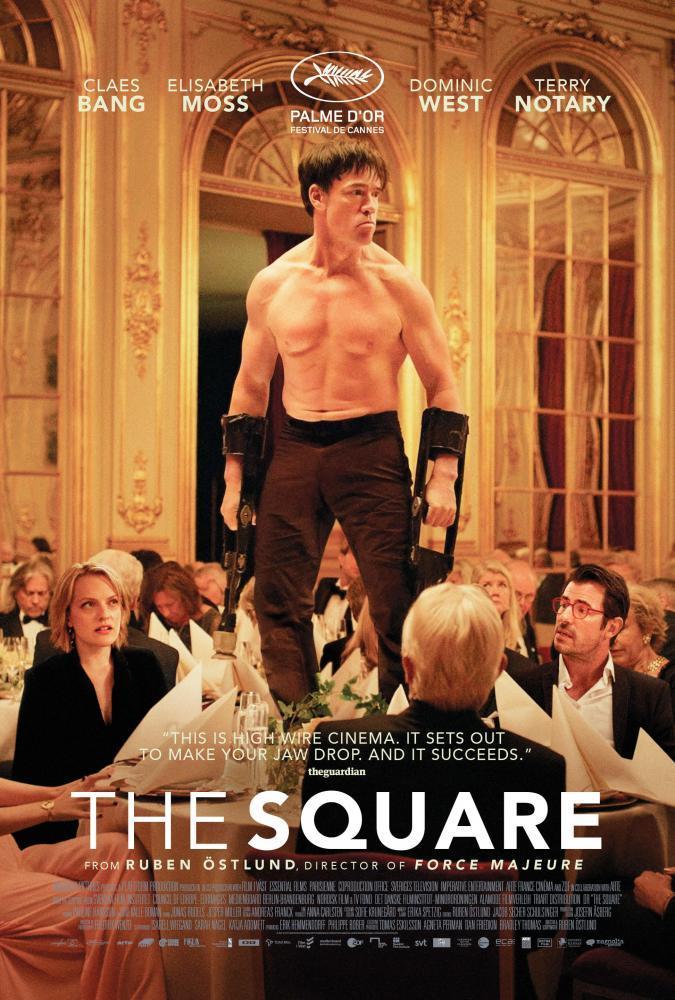NYFF 2017: ‘The Square’ is Magnificently Enigmatic
The new Rube Östlund movie, The Square is a comedy-drama that follows a museum curator and the obstacles he faces when hiring a public relations team for his new installation. The movie hits the cinemas on Oct. 27 in the US.
October 2, 2017
“The Square is a sanctuary of trust and caring. Within it, we all share equal rights and obligations.” This is the mantra of a new exhibit opening at an avant-garde museum in Sweden and is the basis for Ruben Östlund’s Palme d’Or (the most prestigious honor at Cannes Film Festival) award winner, “The Square.” The film is as enigmatic and strange as one would hope for a piece of art meant to satirize art itself.
Claes Bang plays Christian, the chief curator of a prominent Swedish museum called the X-Royal. One morning on his way to work, in a surreal sequence of events, he is robbed of his phone and wallet. To retrieve his belongings, he uses an unorthodox method that has unusual and unexpected consequences.
While dealing with the morality of his peculiar situation, Christian must also find a way to market the museum’s revolutionary exhibit, “The Square.” The museum hires a team that creates a polarizing and bluntly offensive ad, infuriating the media and the public. As Christian spreads himself thin between these two consuming tasks, he also has a puzzling — and amusing — one-nightstand with an American reporter (Elizabeth Moss) and is responsible for his two pugnacious daughters.
The goal for “The Square” exhibit and Christian’s own aspiration, is to promote the idea of an inherent good in society. It asks the question: can we trust one another in this public space? However, when Christian has his wallet and phone stolen ironically in a large public square in Stockholm, the whole concept of trust is turned on its head.
In an excruciatingly long casting process, Bang was chosen to portray the film’s protagonist. The Danish actor is primarily a stage actor, unknown to mainstream audiences, but at age 50 he has soared into the international spotlight. His performance is simultaneously comedic and paranoid, as he grows overwhelmed by his crashing reality. Opposite him is the talented Moss, who plays an amateur journalist. Her role is equally as funny and raises the idea that power is the driving force behind lust. Bang and Moss’s interplay is an entertaining and skillfully choreographed feature of the film.
The film’s seminal scene involves an interactive and thought-provoking art piece with an ape-like, primitive man (Terry Notary) who terrorizes the prestigious attendees of the gala. The guests are told to ignore him and not display fear, but when the situation escalates and becomes intensely violent, the guests must decide whether to heed the instructions or to help. It is by far the most engrossing sequence in “The Square,” purely due to its sheer spectacle and provocative nature.
It may be premature to hail “The Square” as the greatest film of the year, but if anything, it is undoubtedly the most rousing and intriguing. An atypical victor of the Palme d’Or, “The Square” combines social satire and outrageously bizarre scenes like something out of a dream. The film already has and will continue to outrage some and immensely please others. No matter what the effect on the audience, “The Square” captures the essential requirement of unconventional and innovative filmmaking: the evocation of compelling and potent feelings from the viewer. It is precisely this that has already cemented “The Square” as a strikingly influential film of our time.
A version of this article appeared in the Monday, Oct. 2 print edition. Email Daniella Nichinson at [email protected].

























































































































































